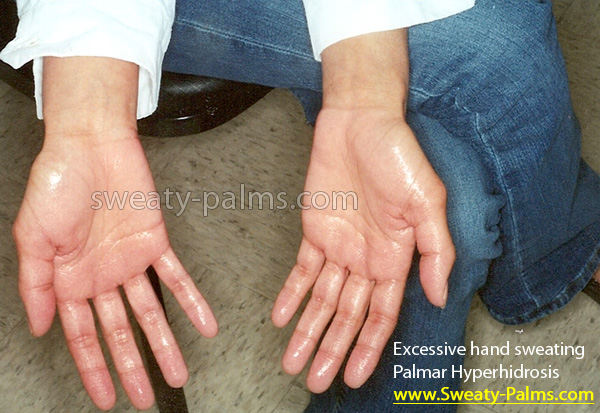Targeted Dermatology Treatments for Hyperhydrosis of Hands and Feet: Effective Solutions
Targeted Dermatology Treatments for Hyperhydrosis of Hands and Feet: Effective Solutions
Blog Article
Understanding the Origin of Excessive Sweating and Its Influence On Day-to-day Live
Extreme sweating, additionally called hyperhidrosis, is a problem that affects a significant part of the populace, yet its hidden reasons and effects on everyday operating remain rather enigmatic. While it is typically comprehended as a physical action to manage body temperature level, the triggers for too much sweating can differ extensively amongst people, including not only physical aspects however also psychological and emotional elements. In addition, the influence of this condition extends beyond mere pain, commonly influencing social interactions and overall high quality of life. By delving into the root creates of hyperhidrosis and exploring its diverse impacts, a deeper understanding of this prevalent concern can be obtained, clarifying the intricacies that individuals grappling with extreme sweating browse on a daily basis.
Physiology of Sweat Glands
The regulation of sweat production, a crucial physical procedure, is mostly controlled by the task of gland distributed throughout the body. Sweat glands are classified into 2 main kinds: eccrine and apocrine glands. Eccrine glands are the most numerous and are located in nearly all areas of the body. They play a crucial role in thermoregulation by producing a watery fluid onto the skin's surface area, which assists and vaporizes cool the body down. On the other hand, apocrine glands are concentrated in locations rich in hair follicles, such as the underarms and groin, and their secretions are thicker and milky in look.
When the body temperature increases, either as a result of physical activity, high temperature levels, or psychological tension, the nerve system activates the gland to produce sweat. This sweat is composed largely of water and electrolytes like salt and chloride. The process of sweat production is crucial for maintaining the body's interior temperature level within a narrow, ideal variety, highlighting the critical role sweat glands play in human physiology.
Triggers for Excessive Sweating
In comprehending the root creates of too much sweating, it is vital to determine the triggers that can lead to this physiological feedback. Physical effort, high temperatures, and spicy foods are also recognized to trigger excessive sweating in people susceptible to this condition.
In addition, medicines such as some antidepressants, opioids, and certain supplements can likewise serve as triggers for hyperhidrosis. Recognizing these triggers is necessary in handling excessive sweating properly - Treatment for hyperhydrosis of hands and feet. By determining and addressing the details triggers that prompt too much sweating in an individual, medical care providers can establish personalized therapy strategies to minimize this problem and improve the person's quality of life
Medical Conditions Associated
Connected with excessive sweating are different clinical conditions that can worsen this physical feedback. One common problem is hyperhidrosis, a disorder characterized by extraordinarily increased sweating that surpasses the body's thermoregulatory demands. This can manifest in focal areas like the palms, soles, underarms, or face, influencing a person's quality of life because of social embarrassment and discomfort.
Additionally, endocrine conditions such as hyperthyroidism, diabetes mellitus, and menopausal warm flashes can additionally cause too much sweating. Hyperthyroidism creates an overflow of thyroid hormonal agents, increasing metabolic process and activating sweating. Diabetes can generate sweating episodes, especially throughout hypoglycemic episodes when blood glucose degrees go down too reduced. Menopausal warm flashes, credited to hormone variations throughout menopause, can create extreme and unexpected sweating, frequently gone along with by flushing and heart palpitations.
Additionally, infections like endocarditis, tuberculosis, and hiv have been connected with evening sweats, a typical sign known to disrupt rest and impact total wellness. These medical problems highlight the diverse variety of underlying variables that can contribute to too much sweating, requiring extensive evaluation and monitoring by health care specialists.
Mental and emotional Elements

Influence On Social Communications
Excessive sweating can have extensive results on a person's capability to engage comfortably in social see this interactions. The noticeable signs of sweat discolorations or wet spots on garments can bring about shame and self-consciousness, causing individuals to withdraw from social scenarios. This withdrawal can influence connections, limit social activities, and prevent specialist and personal growth.

Additionally, the anxiousness and self-esteem issues coming from extreme sweating can influence interaction and social skills. Individuals may have a hard time to concentrate on conversations, join group activities, or express themselves confidently. This can result in feelings of isolation and solitude, as social connections end up being challenging to preserve.
Final Thought

While it is typically understood as a physiological feedback to control body temperature level, the triggers for extreme sweating can differ commonly among individuals, encompassing not just physical aspects however also emotional and emotional components. By delving right into the root causes of hyperhidrosis and discovering its multifaceted impacts, a deeper understanding of this pervasive concern can be obtained, losing light on the intricacies that like it people grappling with too much sweating navigate on an everyday basis.
Physical effort, high temperatures, and spicy foods are likewise known to activate extreme sweating in individuals susceptible to this condition. By determining and resolving the details triggers that trigger too much sweating in a specific, continue reading this healthcare providers can create individualized therapy strategies to relieve this problem and improve the individual's quality of life.
Excessive sweating can have profound effects on an individual's ability to involve easily in social interactions.
Report this page